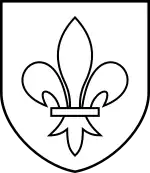Duchy of Świecie and Lubiszewo Księstwo świecko-lubiszewskie (Polish) | |||||||||||||
|---|---|---|---|---|---|---|---|---|---|---|---|---|---|
| 1227–1227/1233 | |||||||||||||
 Coat of arms
| |||||||||||||
| Official languages | Polish, Latin | ||||||||||||
| Religion | Roman Catholic | ||||||||||||
| Government | Duchy | ||||||||||||
| Duke | |||||||||||||
• 1227–1227/1233 | Warcisław I of Świecie | ||||||||||||
| Historical era | High Middle Ages | ||||||||||||
• Partition of the Duchy of Pomerelia | 1227 | ||||||||||||
| 1227/1233 | |||||||||||||
| |||||||||||||
Duchy of Świecie and Lubiszewo[lower-alpha 1] was a duchy in Pomerelia centred around Świecie and Lubiszewo. It was formed in 1227 from the partition of the Duchy of Pomerelia and existed until between 1227 and 1233 when it was partitioned between duchies of Gdańsk, Lubiszewo and Białogarda.[1][2]
History
In 1227, after the death of Leszek the White, the High Duke of Poland, the Duchy of Pomerelia had achieved independence from the Kingdom of Poland. Following that, the duke of Pomerelia, Swietopelk II, had partitioned the county between himself and his brother, Warcisław I of Świecie, to whom he had given the Świecie and Lubiszewo. Wartisław I had died between 1227 and 1233. Following his death, his state was divided between Swietopelk II, who got the area of Świecie, Sambor II, who got the Duchy of Lubiszewo, and Racibor of Białogarda, who got Duchy of Białogarda.[1][2]
Citations
Notes
References
Bibliography
- Labuda Gerard, Mściwoj I, Słownik biograficzny Pomorza Nadwiślańskiego, vol. 3, Gdańsk. 1997.
- Bądkowski L., Samp W., Poczet książąt Pomorza Gdańskiego, Gdańsk. 1974.
- Śliwiński B., Poczet książąt gdańskich, Gdańsk. 1997.
- Józef Wójcicki, Dzieje Polski nad Bałtykiem. Warsaw. Książka i Wiedza. 1989